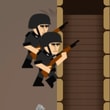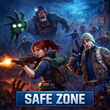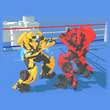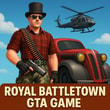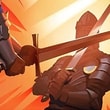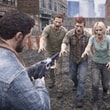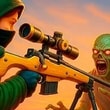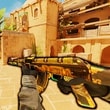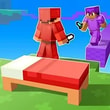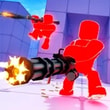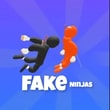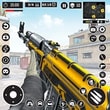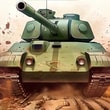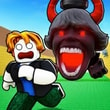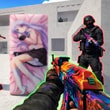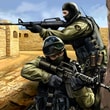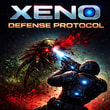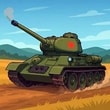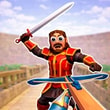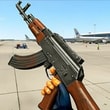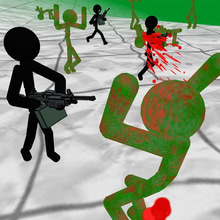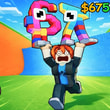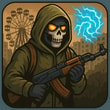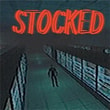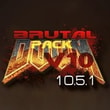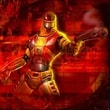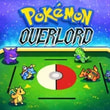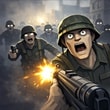 Playground Man!
Playground Man!
Advertisement
..Loading Game..


Stickman Zombie 3D
Advertisement
Advertisement
More Games
Play : Stickman Zombie 3D 🕹️ Game on Kiz10
The siren wails, the streetlights blink like they’re afraid to look, and your stickman is already gripping a gun that feels too light for the night ahead. Stickman Zombie 3D doesn’t beg for introductions; it drops you into a city that hums with trouble and asks a single question the second your boots hit pavement: can you keep moving, keep thinking, and keep shooting when the world won’t stop coming. The first shamble becomes a sprint, the second turns into a swarm, and suddenly your breath is timing your reloads like it’s a metronome. You try a cautious loop around a burned-out car, then try a bolder cut through an alley that felt safe until the shadows stood up. That’s the moment the game clicks. It isn’t about being brave. It’s about being correct, under pressure, twice in a row.
🧟♂️ Momentum, Not Panic
You learn fast that standing still is an invitation. The map rewards circles and figure-eights, little hand-drawn routes that bend crowds into tidy shapes your crosshair can manage. A short burst into legs buys time. A quick pivot past a lamp post turns a mob into a line. The rhythm is simple when you say it out loud—move, turn, clear, move—but your hands discover nuance you didn’t know you had. Feather the stick to keep speed through a corner. Tap fire for control, hold for emergency. If your path feels effortless, you built it right. If it feels heroic, you’re about to get grabbed.
You learn fast that standing still is an invitation. The map rewards circles and figure-eights, little hand-drawn routes that bend crowds into tidy shapes your crosshair can manage. A short burst into legs buys time. A quick pivot past a lamp post turns a mob into a line. The rhythm is simple when you say it out loud—move, turn, clear, move—but your hands discover nuance you didn’t know you had. Feather the stick to keep speed through a corner. Tap fire for control, hold for emergency. If your path feels effortless, you built it right. If it feels heroic, you’re about to get grabbed.
🔫 Feel of the Guns, Feel of Your Nerves
There’s a personality in each weapon that teaches you how to treat it. The pistol’s snap is honest and stingy; it wants headshots and gives back room to breathe when you respect it. The SMG is a hose you shouldn’t trust near windows; it paints damage across a crowd and empties right when greed would be tragic. The shotgun is a promise you cash at nose range and only when the angle is righteous. Later toys stretch the conversation—burst rifles that reward cadence, launchers that buy you space on purpose, scoped choices that turn cross-street alleys into polite galleries. You’re not collecting stats; you’re collecting a language for how you plan to live.
There’s a personality in each weapon that teaches you how to treat it. The pistol’s snap is honest and stingy; it wants headshots and gives back room to breathe when you respect it. The SMG is a hose you shouldn’t trust near windows; it paints damage across a crowd and empties right when greed would be tragic. The shotgun is a promise you cash at nose range and only when the angle is righteous. Later toys stretch the conversation—burst rifles that reward cadence, launchers that buy you space on purpose, scoped choices that turn cross-street alleys into polite galleries. You’re not collecting stats; you’re collecting a language for how you plan to live.
🏙️ Spaces That Teach You To See
The map is never just scenery. A plaza is a breathing room with sneaky dead ends that punish lazy turns. A market lane steals visibility with banners that hide a sprinting biter at exactly the wrong beat. Rooftop shortcuts feel like triumph until you remember gravity loves zombies too and they’ll drop in a second act you didn’t rehearse. Barricades buy single chances, not safety. Doors ask if you really want the noise on the other side right now. Every corner becomes a small decision: wide for speed, tight for surprise control, or mid so you can bail either way. After twenty minutes, you’ll start reading the city like a book you wrote yesterday.
The map is never just scenery. A plaza is a breathing room with sneaky dead ends that punish lazy turns. A market lane steals visibility with banners that hide a sprinting biter at exactly the wrong beat. Rooftop shortcuts feel like triumph until you remember gravity loves zombies too and they’ll drop in a second act you didn’t rehearse. Barricades buy single chances, not safety. Doors ask if you really want the noise on the other side right now. Every corner becomes a small decision: wide for speed, tight for surprise control, or mid so you can bail either way. After twenty minutes, you’ll start reading the city like a book you wrote yesterday.
💡 Micro Habits That Feel Like Superpowers
Keep your reticle at chin height and let enemies walk into accuracy. Reload behind hard cover, not while admiring a perfect spray. Stutter-step when kiting so your bullet pattern stays honest. If you break a line of sight, break it clean—half peeks feed hands you never saw. Count in twos: two seconds to reposition, two to delete the closest problem, two to check your flank, repeat. It sounds silly until you realize your shoulders relaxed and your survival time doubled because your brain found a beat.
Keep your reticle at chin height and let enemies walk into accuracy. Reload behind hard cover, not while admiring a perfect spray. Stutter-step when kiting so your bullet pattern stays honest. If you break a line of sight, break it clean—half peeks feed hands you never saw. Count in twos: two seconds to reposition, two to delete the closest problem, two to check your flank, repeat. It sounds silly until you realize your shoulders relaxed and your survival time doubled because your brain found a beat.
🧪 Upgrades That Change Your Thinking
Spend coins like a realist. A tiny reload bump might let you finish a mag before the big one reaches you; that’s not a number, it’s a life. An extra dash on a cooldown turns risk into a plan. Health is not a crutch; it’s permission to make a brave play once per round on purpose. When the shop offers you a damage nudge or a crowd tool, choose the thing that fits your route. If your loop is narrow, buy control. If your loop is wide, buy efficiency. The best builds feel like you—not someone else’s tier list.
Spend coins like a realist. A tiny reload bump might let you finish a mag before the big one reaches you; that’s not a number, it’s a life. An extra dash on a cooldown turns risk into a plan. Health is not a crutch; it’s permission to make a brave play once per round on purpose. When the shop offers you a damage nudge or a crowd tool, choose the thing that fits your route. If your loop is narrow, buy control. If your loop is wide, buy efficiency. The best builds feel like you—not someone else’s tier list.
🧟 Enemies With Rules You Can Exploit
Shamblers are tempo setters; they’re the drum you play your aim to. Runners don’t announce themselves so much as appear in your peripheral with rude enthusiasm; their tell is the high-pitched scrape right before they lunge. Spitters make sidewalks into geometry problems; step diagonal, never back. Bruisers are walking deadlines; they are slower than your fear says, but faster than your greed hopes. Mini-bosses turn the arena into a bossfight with spectators. None of them cheat, and that’s why it’s fun. Once you learn the tells, you stop being startled and start being surgical.
Shamblers are tempo setters; they’re the drum you play your aim to. Runners don’t announce themselves so much as appear in your peripheral with rude enthusiasm; their tell is the high-pitched scrape right before they lunge. Spitters make sidewalks into geometry problems; step diagonal, never back. Bruisers are walking deadlines; they are slower than your fear says, but faster than your greed hopes. Mini-bosses turn the arena into a bossfight with spectators. None of them cheat, and that’s why it’s fun. Once you learn the tells, you stop being startled and start being surgical.
🎯 Flow Over Frenzy
The game feels best when your decisions are quiet. You choose not to chase a coin bag because the lane you’re in is golden. You let a train of biters get longer so the shotgun earns its paycheck in a single breath. You skip a crate that would force a corner and instead snag it on the rebound when the crowd is thinner. It’s not cowardice—it’s taste. Good scores come from clean maps more than flashy shots. The scoreboard can smell patience.
The game feels best when your decisions are quiet. You choose not to chase a coin bag because the lane you’re in is golden. You let a train of biters get longer so the shotgun earns its paycheck in a single breath. You skip a crate that would force a corner and instead snag it on the rebound when the crowd is thinner. It’s not cowardice—it’s taste. Good scores come from clean maps more than flashy shots. The scoreboard can smell patience.
🎧 Sound That Coaches Without Yelling
Boots on concrete change tone on slick spots, hinting your slide risk a half second before you discover it the expensive way. A low chorus means a new wave curled around a building; a sharp, wet clap means a leap missed and your window is open. Headshot dings are not applause; they’re useful metronome ticks that confirm your reticle work. With headphones you’ll start pre-aiming on a scream’s direction and stepping before a spit lands. It feels psychic. It’s just audio doing honest work.
Boots on concrete change tone on slick spots, hinting your slide risk a half second before you discover it the expensive way. A low chorus means a new wave curled around a building; a sharp, wet clap means a leap missed and your window is open. Headshot dings are not applause; they’re useful metronome ticks that confirm your reticle work. With headphones you’ll start pre-aiming on a scream’s direction and stepping before a spit lands. It feels psychic. It’s just audio doing honest work.
🧭 Session Loop That Respects Your Time
Rounds escalate fast. You get ten clean minutes that feel like one, and a shop stop that feels like a breath. Each session teaches something small you bring forward. Yesterday you reloaded in the open and paid tax. Today you duck, swap, and return with a grin. Yesterday you burned a grenade for drama. Today you dump it at the alley mouth, turn that section into a funnel, and make easy money out of hard problems. The progress is visible without being loud, and that’s the kind that sticks.
Rounds escalate fast. You get ten clean minutes that feel like one, and a shop stop that feels like a breath. Each session teaches something small you bring forward. Yesterday you reloaded in the open and paid tax. Today you duck, swap, and return with a grin. Yesterday you burned a grenade for drama. Today you dump it at the alley mouth, turn that section into a funnel, and make easy money out of hard problems. The progress is visible without being loud, and that’s the kind that sticks.
🔥 The Hold You’ll Tell Someone About
It starts like a comedy of errors. Early mis-shot, a runner nibbles your pride, and the alley you love is full of the wrong ideas. You almost reset. Instead, the habits arrive on time. Two steps, turn, two taps, breathe. You thread a car hood with a hop that felt like luck last night and like muscle memory now. A bruise-shouldered miniboss rounds the corner and you don’t panic; you fly a slow circle, shave the swarm with the SMG, swap to the shotgun for the big body, and cash a grenade when your feet are exactly where the blast wants them. The street goes quiet in a way that reads like an exhale. You loot by rote, buy the reload you’ve been eyeing, and jog into the next wave like the city owes you a favor. It doesn’t—but you’ve learned how to collect anyway.
It starts like a comedy of errors. Early mis-shot, a runner nibbles your pride, and the alley you love is full of the wrong ideas. You almost reset. Instead, the habits arrive on time. Two steps, turn, two taps, breathe. You thread a car hood with a hop that felt like luck last night and like muscle memory now. A bruise-shouldered miniboss rounds the corner and you don’t panic; you fly a slow circle, shave the swarm with the SMG, swap to the shotgun for the big body, and cash a grenade when your feet are exactly where the blast wants them. The street goes quiet in a way that reads like an exhale. You loot by rote, buy the reload you’ve been eyeing, and jog into the next wave like the city owes you a favor. It doesn’t—but you’ve learned how to collect anyway.
Stickman Zombie 3D on Kiz10 is clean arcade survival where planning beats panic and rhythm beats brute force. Build a route you can defend. Buy edges that fit your style. Listen for tells, aim with intent, and treat every reload like a promise you plan to keep. The night will keep getting louder. Your hands will keep getting calmer. That’s the game.
Advertisement
Controls
Controls







